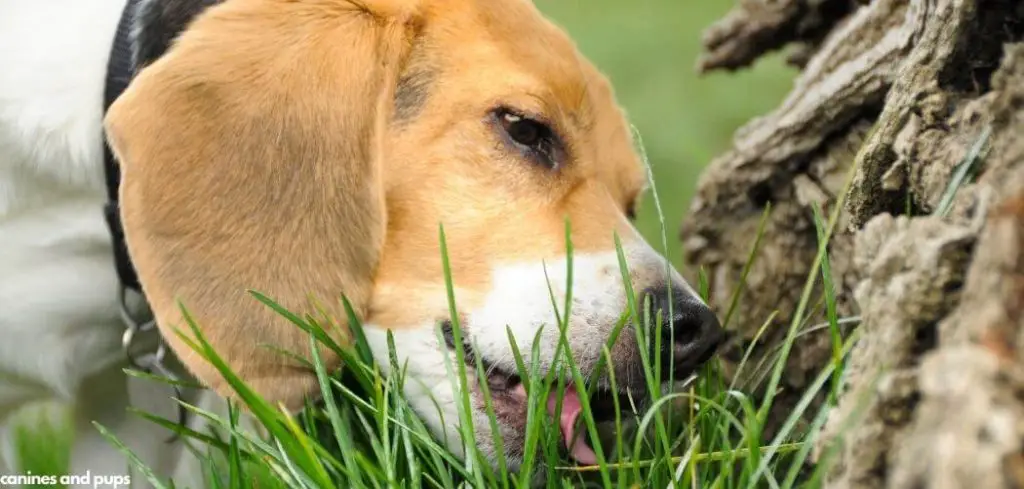Dogs are known for their quirky behaviors, and eating grass is one that often leaves owners puzzled and concerned.
We explain if dogs eating grass can be a sign of cancer, the everyday reasons why it usually happens, what you can do, and when to see a vet.
Is Eating Grass a Sign of Cancer in Dogs — Why It Happens
Dogs eating grass is usually not a sign of cancer. Most often, it happens because of boredom, anxiety, an upset stomach, or simply because they enjoy the taste and texture. However, if grass eating is excessive, persistent, or paired with symptoms like vomiting, weight loss, or lethargy, it may signal an underlying illness — including cancer — and a vet visit is recommended.

Why Dogs Eat Grass: Common Causes
Normal Canine Behavior
Many dogs eat grass simply because they like the taste or texture. Dogs are natural scavengers, and grazing on plants can be part of their instinctive behavior.
In these cases, the dog shows no other signs of illness and remains active, playful, and healthy. While concerning to owners, this is typically harmless.
Read more: Dog with Cancer and Diarrhea (Understanding the causes)
Gastrointestinal Upset
Grass-eating is often linked to stomach upset. Some dogs will eat grass in an attempt to induce vomiting and relieve nausea or discomfort.
Occasional vomiting after grass consumption is not always alarming, but if it becomes frequent, it may indicate gastrointestinal disease, infections, or even a blockage.
Nutritional Deficiencies
In certain situations, dogs may eat grass because they are lacking fiber or other nutrients in their diet. This behavior can be more noticeable in dogs fed lower-quality food or unbalanced homemade diets.
While this is not a direct sign of cancer, poor nutrition can weaken a dog’s immune system and make them more vulnerable to disease.
Stress and Anxiety
Some dogs turn to grass-eating as a coping mechanism when they feel anxious, bored, or stressed.
Dogs left alone for long periods or those with high energy levels may graze as a way to occupy themselves.
Although not directly related to cancer, chronic stress can impact overall health, and unusual repetitive behaviors should be monitored.
Gastrointestinal Disorders and Cancer
When dogs eat grass excessively and it is paired with red flags like chronic vomiting, diarrhea, weight loss, or blood in stool, it may signal a deeper health issue.
Digestive tract cancers, such as stomach or intestinal tumors, can cause discomfort and nausea, leading a dog to eat grass more frequently.
Unlike occasional harmless grazing, this type of grass consumption is usually persistent and accompanied by other worrisome symptoms.
Liver or Pancreatic Disease
Diseases of the liver and pancreas can also cause dogs to eat grass due to nausea and changes in appetite. In some cases, these conditions may be linked to cancer affecting the liver or pancreas.
Owners may notice additional signs such as jaundice, weakness, or abdominal swelling, which require urgent veterinary evaluation.
What to Do
If a dog occasionally nibbles on grass but otherwise seems healthy, it may not be cause for alarm. However, consistent monitoring is important.
Providing a high-quality, balanced diet can help rule out nutritional deficiencies. Ensuring plenty of exercise, play, and mental stimulation may reduce stress-driven grazing.
Keeping a journal of when and how often the dog eats grass, along with any related symptoms, can help identify patterns.
If grass-eating is frequent and paired with vomiting, diarrhea, or appetite changes, consider limiting access to grass treated with chemicals or pesticides. Instead, offer safe alternatives like dog-friendly greens or fiber supplements under veterinary guidance.
Ultimately, owners should focus less on the grass-eating itself and more on the overall health and behavior of their dog.
When to Call or Visit Your Vet
If grass-eating is occasional and your dog appears normal, you can usually wait and watch. However, persistent or obsessive grass consumption warrants veterinary advice.
Immediate veterinary care should be sought if grass-eating is accompanied by repeated vomiting, blood in stool or vomit, unexplained weight loss, lethargy, drooling, or difficulty eating. These signs may indicate something more serious, including cancer or organ disease.
Older dogs, in particular, should be monitored closely, as cancer risk increases with age. Any sudden change in appetite, behavior, or energy level deserves professional evaluation.
Read more: Dog Eating Grass Excessively (Here’s Why)
Key Takeaway
Grass-eating in dogs is often harmless and related to natural instincts, mild stomach upset, or dietary needs.
However, when paired with troubling symptoms like vomiting, weight loss, or bloody stools, it can sometimes signal more serious issues, including cancer.
Pet owners should carefully monitor their dog’s overall health and seek veterinary guidance when grass-eating is excessive or paired with illness.
With early detection and proper care, many underlying causes can be managed, giving dogs the best chance at a healthy, comfortable life.
